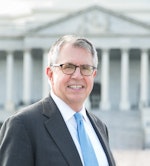The U.S. Congress has completed work on four COVID-19 economic stimulus initiatives. Beginning with the third economic stimulus legislation, the CARES Act, automotive repairers saw much needed opportunity for financial assistance through the Paycheck Protection Program (PPP) and the enhanced Economic Injury Disaster Loan (EIDL).
Recently, the Congress has moved forward with the Paycheck Protection Program Flexibility Act. This new law includes the following key provisions:
- Extends the covered PPP period from 8 weeks to 24 weeks.
- Replaces the 75/25 rule with a 60/40 rule. The current rule requires that 75 percent of the loan must be used on payroll costs and 25 percent to be used on mortgage interest, rent and utilities.
- All new PPP loans will receive a 5-year maturity. Existing loans remain at a 2-year maturity.
- Allows businesses that receive forgiveness to also receive payroll tax deferment.
- Ensures small businesses won’t be penalized by high unemployment benefits.
- Creates a safe harbor for businesses that are required to open at only 50 percent capacity.
Prior to the Paycheck Protection Program Flexibility Act becoming law, the U.S. House of Representatives passed their fifth COVID-19 economic stimulus package, the HEROES Act. This partisan legislation proposes additional changes to the PPP program. The Senate has not scheduled action on the HEROES Act but is considering their own fifth stimulus legislation which is likely to occur this summer.
Congress has continued to monitor the PPP and EIDL programs. There are numerous members of Congress who have proposed additional legislation to assist small businesses during the pandemic period. The Administration has been very active in implementing these new programs and program reforms quickly. As part of Congress’ oversight of the stimulus programs, in a recent hearing before the U.S. Senate Small Business Committee, Secretary of the Treasury Steven Mnuchin testified, “Turning to the PPP, the SBA and Treasury worked together to launch this unprecedented program in only 6 days. In less than two months, the PPP is supporting the employment of approximately 50 million workers and more than 75 percent of the small business payroll in all 50 states. This is an extraordinary achievement.”
U.S. Small Business Administration Administrator Jovita Carranza stated at the Senate hearing, “The agency rolled out the program (PPP) six days after enactment of the CARES Act, and we continue to manage a program that has provided over 4.5 million loans for over $510 billion in much-needed financial relief to America’s small businesses.”
The Automotive Service Association (ASA) has been concerned about the long-term impact of the COVID-19 pandemic on auto repair shops and has joined the America Recovery Fund Coalition comprised of over 100 organizations across 30 business sectors. The Coalition seeks to address those economic issues for the business community that reach beyond the assistance of the PPP program. Specifically, the Coalition has asked Congress to consider a fund that:
- Provides federal grants for operational expenses to help businesses reopen and stay open as they navigate a new normal.
- Includes anti-abuse mechanisms and strict federal oversight.
- Differs from PPP in several meaningful ways:
- Much less restrictive to the size and type of businesses that are eligible.
- Gives businesses important additional leeway for how they use funds.
- Designed to avoid the unintentionally competitive environment created by PPP scarcity.
- Provides a level of certainty at a time of unprecedented levels of uncertainty.
- Largely automated, transparent application that does not require existing relationships with third-party lenders.
With this year being an election year, this second session of the 116th Congress will likely be a short session. Hopefully, the Senate will complete work on the fifth COVID-19 economic stimulus package before going home for the August break. Congress will return in September for what will be a brief period to complete work on the Fiscal Year 2021 appropriations legislation.




